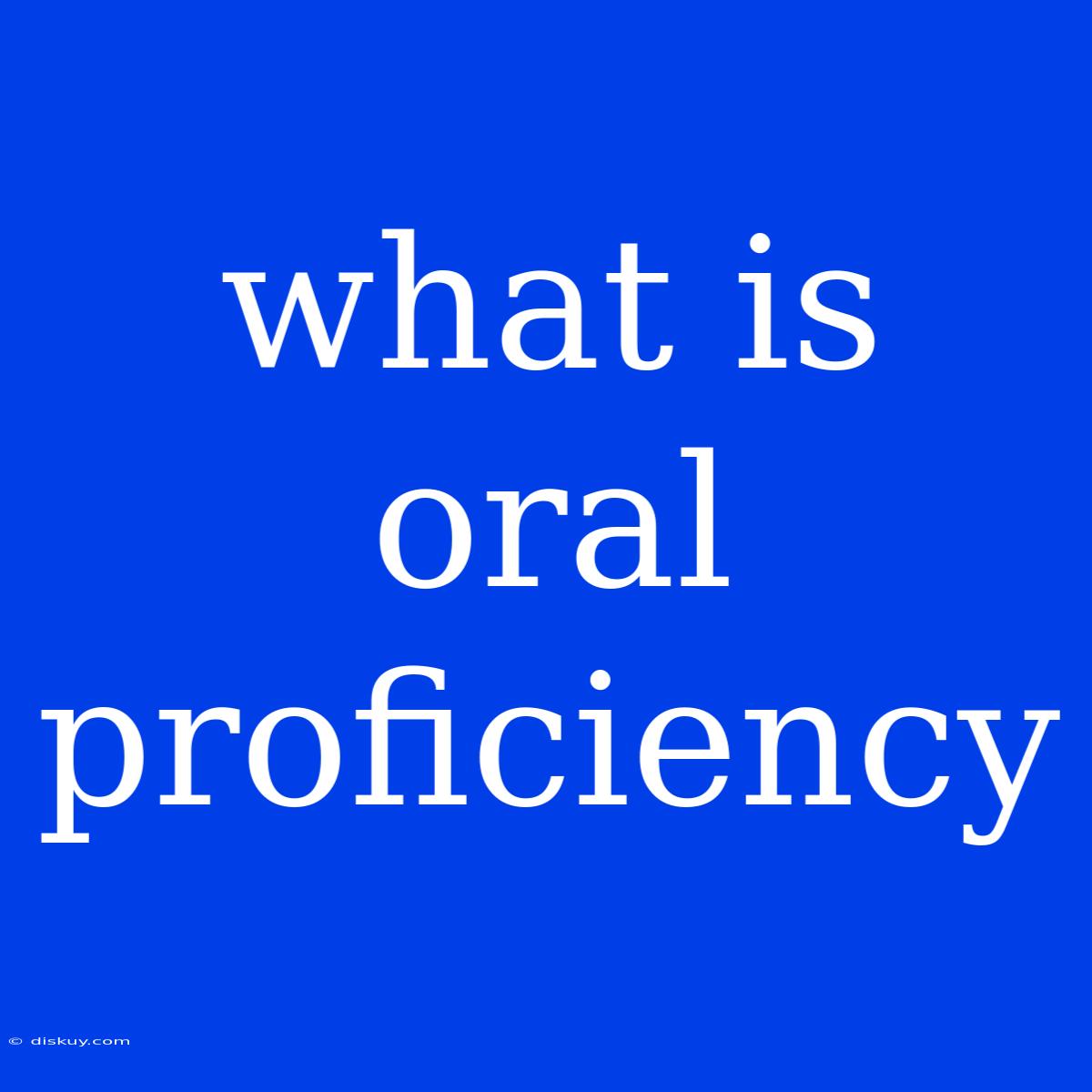What is Oral Proficiency: Unlocking the Power of Spoken Language
Is oral proficiency simply being able to speak a language? While speaking is a crucial component, it's much more than that. Oral proficiency represents the ability to communicate effectively and appropriately in a spoken language. It's not just about stringing words together; it's about conveying meaning, understanding nuances, and adapting communication to different contexts.
Editor Note: This article explores the multifaceted concept of oral proficiency, outlining its key components and why it's crucial for personal and professional growth.
Why is this topic important?
Oral proficiency is a valuable skill in today's increasingly globalized world. It's essential for personal connections, educational pursuits, professional opportunities, and navigating diverse cultures. Understanding the intricacies of oral proficiency helps us improve our own communication skills and appreciate the richness of human language.
Our Approach: This guide delves into the essential components of oral proficiency, drawing insights from language acquisition research and practical communication strategies. We've examined various resources to provide a comprehensive understanding, offering practical advice and insightful examples.
Key Aspects of Oral Proficiency
| Aspect | Description |
|---|---|
| Fluency | The ability to speak smoothly and effortlessly, with minimal pauses or hesitations. |
| Accuracy | Using correct grammar, pronunciation, and vocabulary. |
| Comprehension | Understanding spoken language, including complex ideas and subtle nuances. |
| Interaction | Effectively engaging in conversations, responding appropriately, and asking questions. |
| Strategic Competence | Adapting communication style to different situations and audiences. |
Understanding Oral Proficiency
Fluency:
Fluent communication flows naturally and effortlessly. This involves speaking at a comfortable pace, using appropriate pauses, and maintaining a smooth rhythm.
Facets of Fluency:
- Rate: The speed at which you speak, ensuring clarity without rushing.
- Rhythm: The natural flow of speech, characterized by intonation and stress patterns.
- Pauses: Strategic silences that enhance comprehension and emphasize points.
Accuracy:
Accurate language use builds trust and comprehension. This includes using correct grammar, pronunciation, and vocabulary, demonstrating proficiency in the language.
Facets of Accuracy:
- Grammar: Mastering the rules of sentence structure, verb conjugation, and other grammatical principles.
- Pronunciation: Speaking clearly and accurately, adhering to the language's phonological system.
- Vocabulary: Using a range of words appropriately, both common and less frequent terms.
Comprehension:
Understanding what you hear is essential for effective communication. This involves recognizing different accents, interpreting non-verbal cues, and comprehending complex ideas.
Facets of Comprehension:
- Listening: Actively listening to the speaker, focusing on both verbal and non-verbal cues.
- Interpretation: Drawing meaning from what is spoken, considering context and cultural nuances.
- Summarization: Concisely rephrasing the key points of what you heard, demonstrating comprehension.
Interaction:
Successful communication involves active participation and engagement. This means responding appropriately, asking questions, and taking turns in conversation.
Facets of Interaction:
- Turn-taking: Knowing when to speak and listen, maintaining a natural flow of conversation.
- Initiation: Starting conversations and initiating topics, demonstrating confidence and engagement.
- Response: Providing relevant and thoughtful answers, contributing meaningfully to the conversation.
Strategic Competence:
Effective communicators adjust their style based on the situation and audience. This involves tailoring vocabulary, tone, and register to suit different contexts.
Facets of Strategic Competence:
- Register: Using appropriate language for different situations, from formal to informal.
- Code-switching: Adapting language to different audiences, potentially incorporating slang or technical terms.
- Repair: Correcting misunderstandings, politely asking for clarification, and maintaining a smooth flow of communication.
FAQs about Oral Proficiency
Q: Is oral proficiency the same as fluency?
A: While fluency is a key aspect of oral proficiency, it's not the only one. Accuracy, comprehension, and interaction are equally important.
Q: How can I improve my oral proficiency?
**A: ** Immerse yourself in the language, practice speaking regularly, and seek feedback from native speakers.
Q: What are the benefits of oral proficiency?
A: It opens doors to new opportunities, expands your worldview, and strengthens your communication skills.
Q: What are some common mistakes people make when speaking?
A: Using incorrect grammar, mispronouncing words, and not adapting to different contexts.
Q: Is oral proficiency important for academic success?
A: Absolutely. Strong oral proficiency can enhance communication in classrooms, presentations, and research.
Tips for Improving Oral Proficiency
- Immerse yourself: Surround yourself with the language through movies, music, podcasts, and books.
- Practice regularly: Find a language partner or join a conversation group.
- Record yourself: Identify areas for improvement and track your progress.
- Seek feedback: Ask native speakers for constructive criticism on your speaking.
- Be patient: Improving oral proficiency takes time and effort. Celebrate small victories along the way.
Summary of Oral Proficiency
Oral proficiency is a complex skill that encompasses fluency, accuracy, comprehension, interaction, and strategic competence. By understanding these key aspects, we can enhance our own communication skills and appreciate the diversity and richness of human language.
Closing Message: Developing oral proficiency is a rewarding journey that opens doors to personal and professional growth. Whether you're preparing for a job interview, traveling to a new country, or simply seeking deeper connections, mastering spoken language enriches your life in countless ways.

